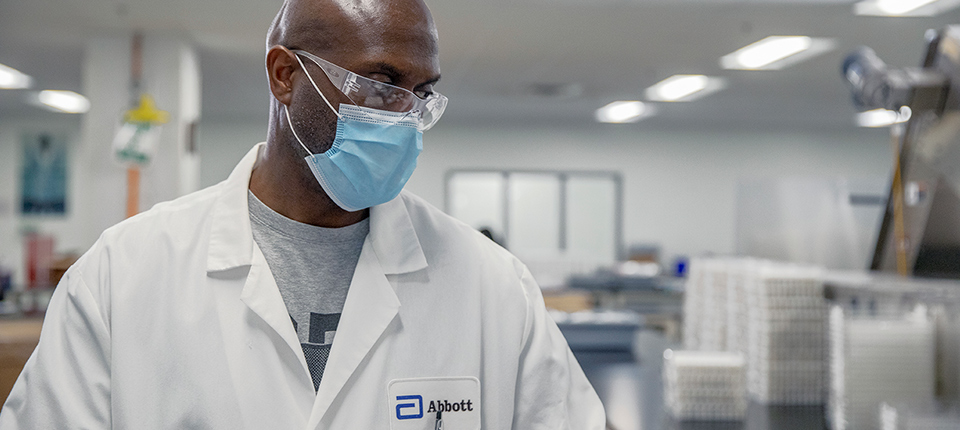
Resilience in a Time of Disruption
Abbott's robust supply chain helps us bring new COVID-19 tests and all of our life-changing tech to millions, even in a pandemic.
Dec. 15, 2020
- Copy Link
- Share on X
- Share on Facebook
- Share on Linkedin
In the first months of 2020, the world needed urgent new answers to battle the COVID-19 pandemic.
When the world called, we answered — taking on one of the greatest challenges of our lifetimes. We created a series of antigen, molecular and serology tests to confront the virus in different ways. What traditionally takes years, was done in months.
It hasn't been easy. We worked around the clock, and found new ways to accelerate our efforts at every step — because every minute counted.
This is the moment Abbott was built for: bringing forward new innovations when people need them most. At the same time, invention was only part of the answer. Key to making it a reality was the company's resilient supply chain. Getting tests to people who needed them required a comprehensive effort. Securing supplies. Scaling up manufacturing. Quickly expanding distribution.
As soon as the pandemic began, Abbott started investing hundreds of millions of dollars in high-tech manufacturing, leveraging and fortifying our strong supply chain.
Abbott works with more than 75,000 suppliers in 120 countries. This intricate global network enables the company to get its life-changing technologies — including our COVID-19 tests — into the hands of the millions of people around the world who need them, when they need them.
With a supply chain this sweeping, even small disruptions can have a major impact. And this year, the COVID-19 pandemic tested global supply chains in ways few have ever seen.
The pandemic has been called the single biggest disruptive event of the past decade, but Abbott was prepared, thanks to its long-time commitment to reinforcing the continuity and flexibility of its supply chain. This is just one example of how Abbott is building a more resilient and sustainable business — an important element of its 2030 Sustainability Plan.
Abbott's long-standing supply-chain efforts include:
- Positioning strong and reliable sources in key global locations
- Developing continuity plans to ensure we have the necessary workforce to continue production
- Performing regular audits of suppliers at high risk for sustainability issues
- And constantly monitoring the most relevant risks
This resilience enables Abbott to get its critical health products to the people who depend on them and, in doing so, helps maintain our leadership in key markets and continues to increase the company's value for shareholders and for society in general.
"Not many people think about what it takes from a manufacturing and logistics perspective to get our technologies to the people who need them. Then you add in disruptions, whether it's a pandemic, natural disaster or border closures, and a complicated process becomes even more complex," said Scott House, Abbott's senior vice president of Quality Assurance, Regulatory and Engineering Services.
"Abbott's robust supply chain is key to keeping millions of people healthy around the world."
Why supply chain resiliency matters
A supply chain is essentially a network through which products are produced and distributed to the people who need them.
Abbott's global network is overseen by the company's Global Operations Council, which is made up of senior leaders representing division and corporate operations. This group helps ensure we're prepared for disruptions when they happen and that the impact on our supply chain is minimal, if at all.
Research shows global supply chain disruptions are increasing in frequency and magnitude. In fact, averaging across industries, companies can expect supply chain disruptions lasting a month or longer every 3.7 years, according to a McKinsey & Company report.
The pandemic, of course, has been more than a disruption. For Abbott, COVID-19 has been an around-the-clock challenge, bringing the company's purpose to life and leading to a manufacturing and logistics marvel — producing tens of millions of COVID-19 tests in a matter of weeks and getting millions of essential medications and nutritional products to people around the world when flights were grounded and borders closed.
All of this was made possible by the company's supply chain, built to function even under the greatest stresses.
For instance, Abbott's continuity planning and long-standing partnerships with suppliers enabled the company to: establish railway routes for transporting its essential medicines from its established pharmaceuticals business, quickly turn three buildings into highly automated new production facilities for COVID-19 tests, get the needed materials for the tests, ramp-up their production and pull in hundreds of employees from businesses across the company to ensure it had enough people to do the work.
"Our efforts during the pandemic were extraordinary, but not surprising. We take steps every day to make our supply chain as strong and resilient as possible, and our 2030 Sustainability Plan places a renewed focus on strengthening our operations so we can serve the people who depend on us," said Ric Schneider, Abbott's chief procurement officer.
For the latest on Abbott’s life-changing technology, get updates directly in your inbox.